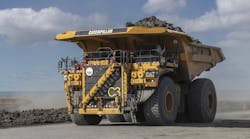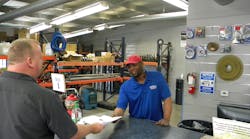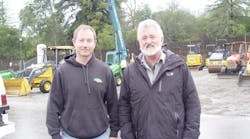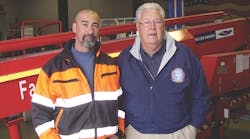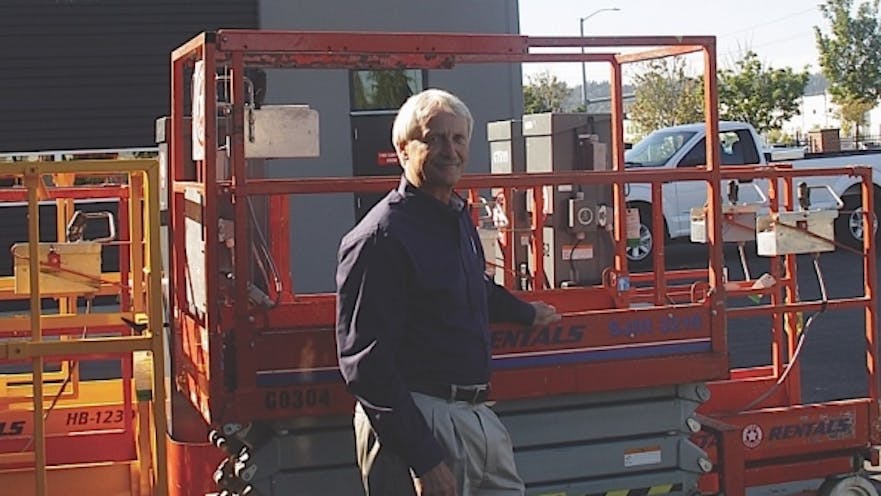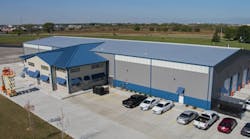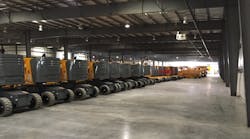It took Bob Kendall three years to find a new headquarters for Star Rentals, but it was worth the effort. When he found the perfect 3.5-acre parcel of land in Kent, Wash., 15 miles south of the company’s previous downtown Seattle headquarters, he knew he had scored.
For 54 years, Star Rentals headquarters was on less than an acre of land on 4th Avenue South in downtown Seattle. Over the years the facility became increasingly crowded and the 8,400-square-foot building became crammed and inadequate. Because of the lack of space, Star gradually lost efficiency, losing time to such tasks as having to move equipment around just to be able to load other equipment onto a truck and move it out of the yard.
“We’re so much more efficient here,” says Kendall referring to the new facility, 17,000 square feet on 3.5 acres. “We were so landlocked where we were. Now on any given morning I’ll drive in here and there are two tractor-trailers loading up, maybe another truck from one of the other stores. Maybe a semi delivering a new piece of equipment, and yet we still have all the room in the world, things just flow so smoothly. As our marketing mix evolved there in Seattle, we found a way to make it work. But it was so gradual that we didn’t realize how inefficient we had become.”
There were a lot of reasons for Star Rentals to move to Kent in the southern suburbs of Seattle. The highways into and out of downtown Seattle have become extremely congested – “Southern Californiaesque” Kendall says. About 70 percent of Star’s Seattle staff was commuting from south of the city, a drive that typically took “an hour and 15 minutes on a good day and two hours on a bad day,” Kendall says. And that’s only one way.
Many of those employees now commute around 15 minutes to the new facility.
Just as the commute was a colossal time-waster for most employees, it was the same for deliveries as trucks languished in the choking traffic into, out of and around the city’s clogged core. In the old headquarters, the company would need more assets to get the same amount of business than a smaller store in a less congested area would require.
“We send a truck up from Seattle to the University of Washington in rush-hour traffic, that could be a three-hour turnaround and it’s only about 12 miles, that’s how bad it is,” says Kendall. “So you need to have more assets because you can’t do enough deliveries. So that store, if we didn’t have all that congestion, could maybe get by with three trucks but today we have to have five.”
Apart from the traffic issues, Star badly needed a more spacious facility for its extensive inventory of mostly aerial and earthmoving equipment – Star’s inventory is now about 65 percent aerial equipment – and it made a lot more sense to expand where the land is $15 per square foot (as in Kent where the new headquarters is) rather than $150 per square foot as it is in downtown Seattle. The hefty price of property in downtown Seattle also made it prohibitive for most Star employees to live close by as well.
“The median price of a home in the city of Seattle now is $700,000,” Kendall says. “It is becoming the next San Francisco and for our blue-collar employees, that’s not going to work.”
However, as most equipment rental company executives know, finding land and facilities for this unique business with its equipment, trucks, fuels and liquids is not easy.
“There were a lot of big buildings for lease, but not a lot of land,” says Kendall. “We don’t need much of a building, but we need a lot of land. Those are anomalies of our industry.”
Kendall found two three-and-a-half-acre parcels in Kent that were available but couldn’t get the owners to the table. There was another 10-acre parcel nearby so Star asked its real estate agent if they knew of a developer who would partner with Star. The agent found a California-based company.
“So we get together and we were talking about this 10-acre parcel that was available, and he asked about our needs and what would be ideal,” Kendall recalls. “He said, ‘I’m about ready to get two parcels under contract that are just down the street that are 3.5 acres each.’ I was thinking that sounded really good. So he brings them up on his computer and he spins it around on the table to show me and it was the two parcels I’d been trying to engage the owners on. I told him how we were trying to reach out to the owners and he said, ‘I’ve been trying to [buy this property] for five years, they’d better not be talking to anybody else!’ ”
Ultimately a deal was reached, which included the developer constructing the facility, and the rest is history. “Moving to Kent better suits our needs, and better suits the needs of our employees,” Kendall says.
Now Star’s booms that are 60 feet and higher come out of Kent, along with the heavier telehandlers and other larger machines that can’t easily fit at the Seattle branch. Not only can the new facility handle more equipment and a lot more trucks, it can deliver more efficiently because of much easier freeway access. “This is a great area. It’s just a few minutes off of I-5, right off Highway 167 and about 10 minutes from I-405. So it’s extremely centrally located for getting east, south, north or west, you name it.”
The downtown express
Star Rentals is not abandoning downtown, especially not after having had a presence on 4th Street for 60 years. It is not going away. In fact the company acquired a building right next door to the old headquarters where it is preparing to launch a Star Rentals Express branch. The company is constructing a small 5,000-square-feet building. Star has a lot of clients in Seattle’s Soto District, around Safeco Field where the Seattle Mariners play and CenturyLink Field where the Seattle Seahawks play. It has a lot of relationships with contractors involved in construction projects going on downtown.
“We’ve had a shingle on 4th Avenue for almost 60 years, so we need to continue to be there,” Kendall says. Later this year Star will move into the new building downtown and vacate its old headquarters on the property that Star leased for 60 years but was not able to acquire. The new express branch, which will employ 12 to 14 Star Rentals employees, will enable Star to continue to take care of its customers in the urban core of Seattle.
New analytics
Star’s new level of efficiency, much helped by the new headquarters, is based on other factors as well, including new software and reducing the number of companies in its supply chain and developing supplier uniformity throughout the company.
“If you’re renting from Star Rentals in Spokane, in Seattle, in Portland, it’s all the same products,” Kendall says. “It doesn’t matter if it’s pipe and tool equipment or booms or whatever. We usually have two major boom providers, two major scissors providers, etc. To that end, we have dramatically reduced our downtime, dramatically reduced our service turnaround time. Our parts inventory is just a fraction of what it used to be and so you have this scale of efficiency that comes because our people really know the products, we know what parts to have on hand, and what people don’t need often. If we need something that we don’t have on hand, we know exactly where to get it.”
A big part of Star’s relationship to information technology has developed through its use of Point-of-Rental Software, which has enabled the company to have up-to-the-moment information on virtually any aspect of the business and run any conceivable report on any aspect of the business.
“Prior to the Great Recession, we had about 290 employees,” Kendall says. “Today we’re at about 248. During the Great Recession we got down to about 230 for a short period of time, and pretty quickly we were back up to 240. But now we’re basically doing more volume with fewer people than before, we’re just so much more efficient.
“And the data is just right there. If I want to see what utilization is in a division, for example our Eastern Washington division which is Spokane, Tri-Cities, Yakima, Wenatchee, I can bring it up in a second. I can see exactly what their inventory is; I can see exactly what each individual store’s inventory is, and what their utilization is in real time. You can look at it so many different ways it makes your head spin. Up to and including ‘day at a glance.’ I can look up Wenatchee and see their day at a glance, see exactly what they’ve got going on today and what they got going tomorrow.”
Kendall notes that he was looking at a particular store’s off-rents that had a significant amount of machines called off-rent but not yet scheduled for pickup. “I look at this stuff and it’s an indicator to me that we got a lot of stuff off-rent, it’s extremely congested. So do they need another delivery truck, or do we need to dispatch a truck up there for a couple of days to help them get caught up? And here’s another store where the off-rents are hardly anything at all.”
The software also facilitates its work on jobs as well, such as on industrial shutdowns where the daily tracking of equipment and tools cannot be achieved without robust and efficient technology.
The system offers a lot to the customer who wants access to his accounts online. “If you’re a customer and you want to go on, everything is updated in real time,” Kendall says. “If you looked at it on the first of the month and you had a picture of what you had and you wanted to look at it five days later after you rented all this equipment, everything is right in there. Or any invoicing that took place in those five days is all right there in front of you.”
Star Rentals has worked hard to be on top of technology as it relates to analysis to make the company better and enhancing the customer experience, but Kendall says the vast majority of Star Rentals’ roughly 12,000 active customers still tend to conduct business in a more traditional way, preferring to use the old-fashioned telephone to order equipment rather than online. Although Star Rentals requires at least an e-mail communication to rent a machine – in other words customers can’t usually go online and click on a desired machine in the evening and expect it to be delivered at 5 a.m. but it is easy to make a reservation via e-mail – the telephone and personal relationships between Star staff and customers is still the primary method of communication. And while many of the company’s larger customers do take advantage of the information available, there is still an adoption curve.
“You’d think those commercial guys would want more of this information management, and [adoption] is certainly growing but many of our larger volume accounts don’t even ask for it,” Kendall says. “We’ll talk to them and tell them [about our capabilities] they’ll say ‘Ok that’s great, but just don’t change what you’re doing.’”
New facility
Building a new headquarters in Kent allowed Star Rentals to have room for a lot of things that it couldn’t do before. At the old building there was no conference room at all – there was one until Star ran out of office space and the conference room became the IT office. Meetings were often held in Kendall’s small office. The new facility has two large conference rooms where visiting vendors can make presentations, where Star Rentals’ board can meet onsite, where sales meetings, management meetings, educational seminars can be held with videoconferencing equipment, Apple televisions and other communication tools. Companies can do training sessions with Star Rentals’ service staff.
It’s a bit of a fine line, building a new building. Star Rentals more than doubles its building space from its old headquarters, and has five repair bays compared to three at the old building and has more than three times the land. “It costs a lot of money to build buildings these days and then once you build a building you have to start paying taxes on it,” says Kendall. “You don’t want to short-change yourself and not build enough building, but you don’t want to have so much building that you’re not utilizing all the space.”
Star Rentals developed a supervisory board in recent years which includes representatives from ownership and other advisory personnel. Star has been owned by the Rabel family for more than a hundred years, and Star Rentals since 1960, but the family has never directly participated in the Star Rentals business, seeing themselves as investors rather than owners.
“The board members don’t run the business, they are stewards of the company, to make sure we are being financially responsible, that risk management is in place,” Kendall says. “Understanding what capital budgets are and what we’re doing and spending and that kind of stuff.”
Also Star has trailers on the property for training.
“We made a dedicated training facility for when customers need training or even when we’re orienting our own employees,” Kendall explains. “We also partner with a third-party provider that does come in to do training as well. When we’re over capacity and can’t do it we’ll bring in a third party trainer so they use that facility as well.”
The company primarily offers AWP and forklift training. For a company like Star with a customer base that is almost 100 percent commercial, its safety programs are increasingly important. Kendall explains that customers are becoming very sensitive to what a rental company’s safety programs are.
“How do you practice them, what are your experience modifiers, are you a dangerous company, do you have a lot of losses?” he says. “Companies like Warehouser have a third party company that monitors that kind of stuff for their supply chain. So if you’re coming onsite, they want to know that you’re operating within their parameters. And we’re starting to see it with the bigger construction companies. International and high-profile companies are justifiably concerned about risk management, and the liability issues of potential accidents occurring on their properties. So they say, ‘Ok you’re building this building for us, you’re the contractor, you’re the custodian, but we also are at risk here so we need to make sure that whoever you’re doing business with is responsible as well,’ whether it’s subcontractors or somebody that’s a supplier like us. So safety is everything.”
That message is communicated to all new hires. Drivers typically will spend a few weeks riding along with established drivers. Drivers and mechanics must be trained to operate and understand the entire inventory, and safety training is paramount.
120 Years of history
Many rental companies are proud of their history and have good reason to be but not many, if any, have the years that Star Rentals has, having been originally founded as Star Machinery back in the 1890s. Not only does Star go back about 120 years, but the same family has owned it for its entire history. The company was founded by Christian Rabel in a building located in what today is the north parking lot of CenturyLink Field. The Star Rentals staff is putting together a display so visitors can see its remarkable history.
Rabel, an immigrant from Germany, started in the sawmill business. He became so adept at fixing the steam engine and the belt and other moving parts that he eventually went into the sawmill-fixing business and then started buying used boilers and rebuilding them. Star Machinery was officially incorporated in 1901. Eventually the company evolved into construction equipment and at one time was a dealer for Grove, Worthington air compressors, Pittman, Bobcat, Sullair, Ingersoll-Rand and others. The company was split into Star Machinery and Star Equipment and eventually Star Rentals came into being in 1960.
Although business is strong now, there’s a sense in the Seattle area that it’s currently relatively late in the expansion cycle, but that remains to be seen. Whichever way it goes, Star Rentals always believes that the company must market a value proposition, not just compete on rates.
“The appearance of our equipment, the age of our equipment, nobody has a newer fleet than we do,” Kendall says. “I know there is a lot of chatter about hanging on to it a little longer, but our data doesn’t bear that out. Our margins are a bit better than they were in ’06 and ’07. A lot of it is because we have a newer fleet, lower maintenance and we turn it faster. So ultimately we may go into a down cycle and rate wars will come back but I still strongly believe that you market to a value proposition and you have to persevere. And I think we have done a good job at that.”
